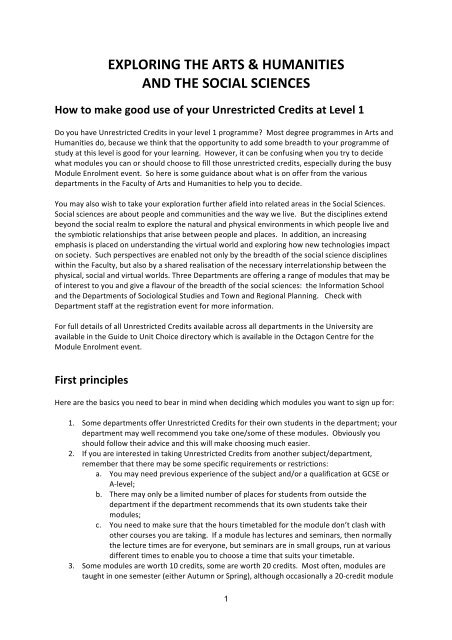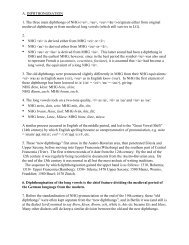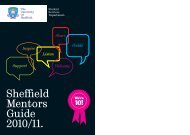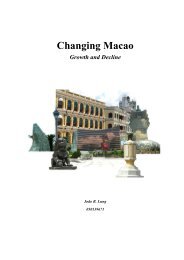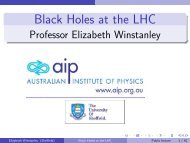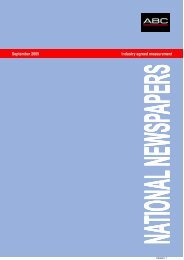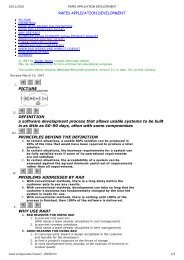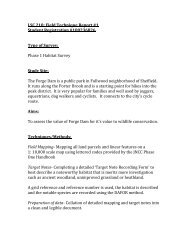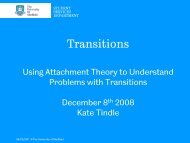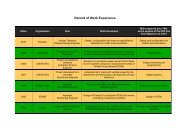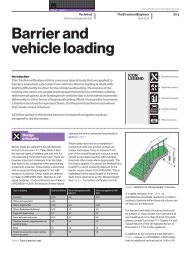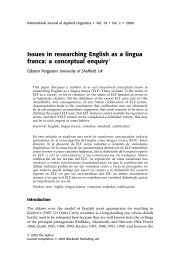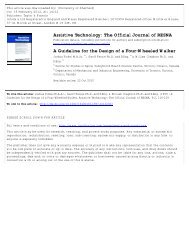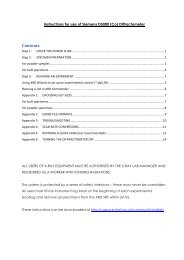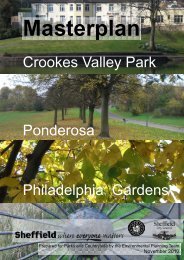Free Modules SOMLAL.pdf
Free Modules SOMLAL.pdf
Free Modules SOMLAL.pdf
Create successful ePaper yourself
Turn your PDF publications into a flip-book with our unique Google optimized e-Paper software.
EXPLORING THE ARTS & HUMANITIES<br />
AND THE SOCIAL SCIENCES<br />
How to make good use of your Unrestricted Credits at Level 1<br />
Do you have Unrestricted Credits in your level 1 programme? Most degree programmes in Arts and<br />
Humanities do, because we think that the opportunity to add some breadth to your programme of<br />
study at this level is good for your learning. However, it can be confusing when you try to decide<br />
what modules you can or should choose to fill those unrestricted credits, especially during the busy<br />
Module Enrolment event. So here is some guidance about what is on offer from the various<br />
departments in the Faculty of Arts and Humanities to help you to decide.<br />
You may also wish to take your exploration further afield into related areas in the Social Sciences.<br />
Social sciences are about people and communities and the way we live. But the disciplines extend<br />
beyond the social realm to explore the natural and physical environments in which people live and<br />
the symbiotic relationships that arise between people and places. In addition, an increasing<br />
emphasis is placed on understanding the virtual world and exploring how new technologies impact<br />
on society. Such perspectives are enabled not only by the breadth of the social science disciplines<br />
within the Faculty, but also by a shared realisation of the necessary interrelationship between the<br />
physical, social and virtual worlds. Three Departments are offering a range of modules that may be<br />
of interest to you and give a flavour of the breadth of the social sciences: the Information School<br />
and the Departments of Sociological Studies and Town and Regional Planning. Check with<br />
Department staff at the registration event for more information.<br />
For full details of all Unrestricted Credits available across all departments in the University are<br />
available in the Guide to Unit Choice directory which is available in the Octagon Centre for the<br />
Module Enrolment event.<br />
First principles<br />
Here are the basics you need to bear in mind when deciding which modules you want to sign up for:<br />
1. Some departments offer Unrestricted Credits for their own students in the department; your<br />
department may well recommend you take one/some of these modules. Obviously you<br />
should follow their advice and this will make choosing much easier.<br />
2. If you are interested in taking Unrestricted Credits from another subject/department,<br />
remember that there may be some specific requirements or restrictions:<br />
a. You may need previous experience of the subject and/or a qualification at GCSE or<br />
A-‐level;<br />
b. There may only be a limited number of places for students from outside the<br />
department if the department recommends that its own students take their<br />
modules;<br />
c. You need to make sure that the hours timetabled for the module don’t clash with<br />
other courses you are taking. If a module has lectures and seminars, then normally<br />
the lecture times are for everyone, but seminars are in small groups, run at various<br />
different times to enable you to choose a time that suits your timetable.<br />
3. Some modules are worth 10 credits, some are worth 20 credits. Most often, modules are<br />
taught in one semester (either Autumn or Spring), although occasionally a 20-‐credit module<br />
1
may be taught over the academic year. You should try to achieve a roughly equal balance in<br />
credits (ie 60:60 or 70:50/50:70) between the two semesters.<br />
4. It’s probably not a good idea to take on too many completely new subjects, or spread your<br />
Unrestricted Credits across too many different areas as this will make your work more<br />
difficult to manage.<br />
5. Remember, if you find you have chosen a module that you don’t get on with, you can<br />
change your modules during the first THREE WEEKS of the teaching semester, ie before 15 th<br />
October. To do this, fill in the ADD/DROP form which you can access from Student Services<br />
Information Desk: http://www.shef.ac.uk/ssid/forms/addrop.html<br />
What’s on offer<br />
Below you will find details by department of modules, with brief course descriptions, timetable<br />
information (if available) and details of any prerequisite experience/qualifications or restrictions on<br />
places. These are listed alphabetically by department. You will always be able to get more<br />
information about the modules from staff on the individual subject desks at the Module Enrolment<br />
event.<br />
Department See Page<br />
Archaeology 3<br />
Biblical Studies 5<br />
English Language and Linguistics 7<br />
English Literature 9<br />
History 10<br />
School of Information 12<br />
Modern Languages 14<br />
Language Courses 14<br />
Arabic 15<br />
Czech 15<br />
Dutch 16<br />
French 16<br />
German 17<br />
Italian 18<br />
Latin 19<br />
Russian 19<br />
Polish 20<br />
Spanish 21<br />
Cultural and Other Courses 22<br />
2
European Film 22<br />
German 22<br />
Intercultural Communication 23<br />
Russian 23<br />
Philosophy 24<br />
Sociological Studies 28<br />
Town and Regional Planning 30<br />
Archaeology<br />
Taking a module in Archaeology can give you some very useful insights into past civilisations, their<br />
influence on our own or other European cultures, and an understanding of how we learn about and<br />
interpret the past, as well as introducing you to the principles of archaeological study itself. This<br />
breadth means that a module in Archaeology is a good choice for students of virtually any other<br />
subject in Arts and Humanities. The Department of Archaeology has six modules you can choose<br />
from; all of these are 20-‐credit modules, and require no previous knowledge of archaeology.<br />
AAP106 Archaeology in the Field<br />
20 Credits AUTUMN<br />
Prerequisite qualification: None<br />
Teaching hours: Lectures (weekly Tues 10-‐11, Wed 10-‐11), Field Classes (Wed 2-‐5, weeks 2-‐6&8),<br />
Tutorials (weeks 6&10), multiple groups, times tba)<br />
Description: How do archaeologists go about excavating ancient remains? What really happens on<br />
an archaeological site? How do we know where to look in the first place? This module takes students<br />
through the state-‐of-‐the-‐art methods of archaeology in the field. It covers how to survey for buried<br />
sites using geophysics, fieldwalking and aerial photography. Surveying in unusual circumstances,<br />
such as graveyards or ancient woodlands, is considered. The practical techniques involved in<br />
excavating remains of all periods are examined, ranging from how to understand soil types to the<br />
uncovering of fragile artefacts. We look at the problems of excavating special sites such as<br />
cemeteries and caves, and find out how the results are published.<br />
AAP110 European Classical Civilisations<br />
20 Credits AUTUMN<br />
Prerequisite qualification: None<br />
Teaching hours: Lectures (weekly Tues 4-‐5, Wed 12-‐1), Tutorials (weeks 3,5,8,10, multiple groups,<br />
times tba)<br />
Description: Greco-‐Roman classical civilisation (particularly the 'high' culture of art, architecture,<br />
literature and political institutions) has long been seen as the inspiration for, and yardstick against<br />
3
which to judge, modern European culture. The rich and varied evidence of modern archaeology is<br />
used to explore how this high culture was supported and experienced by ordinary people. A broad<br />
temporal and geographical focus considers the origins and long-‐term development of this<br />
civilisation, its interaction with neighbouring cultures of the E Mediterranean, N Africa and<br />
temperate Europe, and its role in shaping the development and self-‐image of modern Europe.<br />
AAP111 Discoverers and Discoveries<br />
20 Credits AUTUMN<br />
Prerequisite qualification: None<br />
Teaching hours: Lectures (weekly Tues 12-‐1, Thurs 1-‐2), Tutorials (weeks 4,7,9,11, multiple groups,<br />
times tba)<br />
Description: This module introduces some of the leading figures, ground-‐breaking discoveries, and<br />
key intellectual developments in Old World archaeology over the last two hundred years. The<br />
lectures will explore the stories of iconic sites, from Troy to Stonehenge, and reveal the influence of<br />
key ideas, such as Darwin’s theory of natural selection, on our understanding of the deep and more<br />
recent past. The aim is to give students an understanding of the social contexts in which archaeology<br />
has developed both technically and intellectually since the nineteenth century.<br />
AAP107 Origins of Humanity<br />
20 Credits SPRING<br />
Prerequisite qualification: None<br />
Teaching hours: Lectures (weekly Wed 11-‐12, Thurs 4-‐5), Tutorials (weeks 4,7,9,11, multiple groups,<br />
times tba)<br />
Description: How do we know about our remote, pre-‐human past; how did we evolve, and how do<br />
we study those fully-‐human hunters and gatherers of the last 30,000 years who lived during and<br />
immediately after the last ice age? And how and when did some of them become farmers? This<br />
module provides an introduction to how archaeologists study these questions. It also examines how<br />
we can use fossil, archaeological, and environmental evidence to investigate the evolution of<br />
ourselves and also our now-‐extinct close relatives, the climatic and environmental conditions under<br />
which they lived, and the ways in which people lived up to the development of farming.<br />
AAP108 World Civilisations<br />
20 Credits SPRING<br />
Prerequisite qualification: None<br />
Teaching hours: Lectures (weekly Mon 3-‐4, Wed 12-‐1), Tutorials (weeks 3,5,8,10, multiple groups,<br />
times tba)<br />
Description: The popular image of archaeology is captured by the fictional Indiana Jones in his search<br />
for the lost secrets of ancient civilisations. This module explores some of the most famous early<br />
civilisations, including Mesopotamia, Egypt, and classical Greece and Rome in the Old World, and the<br />
Inca, Maya and Aztecs in the New World. Similarities and differences in the development of these<br />
civilisations are evaluated, as are the contentious roles of colonisation, diffusion, trade and world<br />
systems. The classic civilisations are placed in a wider context by looking at human cultures as<br />
4
diverse as Zimbabwe, the Plains Indians and Australian Aborigines. In conclusion, the module<br />
discusses the relationship between the decline of European colonialism and changing<br />
understandings of what it may have meant to be 'civilised'.<br />
AAP109 Archaeology in the Laboratory<br />
20 Credits SPRING<br />
Prerequisite qualification: None<br />
Teaching hours: Lectures (weekly Tues 9-‐10, Thurs 9-‐10), Lab Practicals (weeks 4-‐9, multiple groups,<br />
times tba), Tutorials (weeks 6,9, multiple groups, times tba)<br />
Description: How do archaeologists find out about the human past? This module explores the<br />
'forensic' potential of scientific analyses of the remains of humans, other animals, plants and<br />
artefacts. Lectures present a variety of case studies of the applications of scientific studies in<br />
archaeology. Laboratory classes introduce students to materials (bones, seeds, pollen, ceramics,<br />
metal, glass) commonly analysed by archaeological scientists. Tutorials provide an opportunity to<br />
discuss the potential and limitations of archaeological science.<br />
Biblical Studies<br />
Courses in Biblical Studies don’t just enable you to understand the Bible and the languages in which<br />
it was written, but they also explore the role of the Bible in modern society and in our cultural<br />
heritage. <strong>Modules</strong> on offer here could appeal to students studying Archaeology, Modern Languages,<br />
English, History or Philosophy<br />
BIB101 Decoding the Bible: The Old Testament<br />
20 Credits AUTUMN<br />
An introductory module for students of any subject and not just Biblical Studies, this module is a<br />
literary journey from Genesis to Revelation, a grand narrative that begins with creation and ends<br />
with the tangled issue of apocalypse. Using English translations, you will gain a sense of the 'big<br />
picture' foundational both for further study of the Bible and for study of English literature, which is<br />
full of biblical imagery and allusions. This module is a good choice if you are interested in history,<br />
literature or religion.<br />
Teaching hours: Lectures: Thursday 2-‐4, plus a seminar group from a range of times on offer.<br />
BIB120 New Testament Greek<br />
20 Credits AUTUMN<br />
This module introduces you to the Greek alphabet, grammar, syntax and vocabulary and will equip<br />
you with the understanding of Greek necessary for reading the New Testament in the original<br />
language. This course is a good choice if you are doing philosophy, English or archaeology.<br />
Teaching hours: Mon 10-‐11, Wed 11-‐12, Fri 11-‐12<br />
5
BIB110 Biblical Hebrew<br />
20 Credits AUTUMN<br />
You will learn the alphabet, be introduced to the grammar and syntax and begin to read Biblical texts<br />
in Hebrew, becoming conversant with the language resources available. By the end of the module<br />
you will be able to approach the Hebrew Bible with some confidence. This is a good choice if you are<br />
interested in Judaism or in expanding your range of languages.<br />
Teaching hours: Wed 9-‐11, Thurs 10-‐11, Fri 10-‐11<br />
BIB114 The Bible: Fact or Fiction?<br />
20 Credits AUTUMN<br />
This is an introductory module for students in any subject and not just Biblical Studies. Is the Bible<br />
fact or fiction? The Bible is often subject to sensationalist and controversial TV programmes or<br />
newspaper articles claiming that it is secret code, myth, history, creation science or fiction. This<br />
module will explore these issues through an examination of the presentation of the Bible in the<br />
media, including TV, film and newspapers. This module is a good choice if you are interested in the<br />
media, advertising or journalism.<br />
Teaching hours: Thursday 10-‐12, weeks 1-‐5 and Tuesday 2-‐4, weeks 6,7,10,11,12<br />
BIB102 Decoding the Bible: The New Testament<br />
20 Credits SPRING<br />
Here you will be introduced to the alphabets and basic grammar of Hebrew and Greek and to vital<br />
issues in the field of biblical studies. You will meet the Bible as it is used in the modern world as a<br />
document of faith and a subject of academic study. Popular and scholarly commentaries and the<br />
Internet will be studied and you will be introduced to translations, word study and methodologies in<br />
biblical studies. This module is a good choice if you are taking English, modern languages,<br />
philosophy or history.<br />
Teaching hours: Thursday 2-‐4<br />
BIB111 Hebrew B<br />
20 Credits SPRING<br />
Prerequisite qualification BIB 110<br />
This module will build on the work done in BIB110.<br />
Teaching hours: Thurs 9-‐10, Fri 9-‐11, + 1 hour tba<br />
BIB121 Greek B<br />
20 Credits SPRING<br />
Prerequisite qualification BIB 120<br />
6
This module will build on the work done in BIB120<br />
Teaching hours: Mon 10-‐11, Wed 12-‐1, Fri 11-‐12<br />
BIB119 The Biblical World<br />
20 Credits SPRING<br />
This module aims to introduce you to some of the diverse cultural worlds of the Bible: the<br />
interlocking cultures of ancient Israel and Judah, and the complex cultural mix of the cities of the<br />
Greco-‐Roman world. You will be encouraged to explore selected aspects of the Biblical texts in<br />
relation to their social world in areas such as: economic and social structures; ritual and belief;<br />
sexuality; slavery; gender; art and architecture; death and burial. This is a good choice if you are<br />
interested in history, archaeology or religion.<br />
Teaching hours: Wednesday 10-‐11, Thursday 4-‐5<br />
BIB1013 Religion in Britain Today<br />
20 Credits SPRING<br />
(to be confirmed)<br />
This module addresses the fact that, from faith schools to family values, from religious dress to<br />
religious wars, in contemporary Britain religion is rarely out of the news. You will look at various<br />
aspects of religion in contemporary Britain, including politics and war, sexuality and marriage, ritual<br />
and symbolism as well as gaining an introduction to the contemporary religious map of Britain and<br />
the diverse religions that contributes to it.<br />
Teaching hours: Thursday 10-‐12<br />
English Language and Linguistics<br />
Linguistics is the study of how languages are structured and used. If you are interested in knowing<br />
more about how Modern English came into being, its sounds, structures and varieties, then the<br />
modules offered in English Language and Linguistics may be of interest to you. You don’t need any<br />
prior qualification, although if you studied English Language at A-‐level, you will find these modules<br />
build upon topics you may have studied as part of that subject.<br />
Places on Linguistics <strong>Modules</strong> will be limited<br />
ELL 110 Varieties of English<br />
20 Credits SPRING<br />
Prerequisite qualifications: None<br />
Teaching hours: Lectures Tuesdays 2.10-‐3pm, Thursday 4.10-‐5pm, plus 1 seminar group,<br />
starting in week 2 (different times are offered to fit in with individual<br />
students’ timetables)<br />
Description: This course explores the extraordinary diversity of the English language today, and is<br />
concerned with describing the features, use and status of contemporary varieties of English in<br />
7
Britain and around the world. Extraterritorial varieties are located within histories of expansion,<br />
colonialism, and globalisation, and considered in relation to the role of English as an international<br />
language. We investigate developments which led to the social and geographic distribution of<br />
certain present day varieties in Britain. Students will apply tools of description for all linguistic levels,<br />
and develop awareness of sociolinguistic aspects of language such as social indexing, attitudes and<br />
standardisation, as well as the relationship between variation and change.<br />
Places may be very limited<br />
ELL 112 Sounds of English<br />
10 Credits AUTUMN<br />
Prerequisite qualifications: None<br />
Teaching hours: Lecture hour Tuesday 3.10-‐4pm, plus 1 workshop session, starting in week 2<br />
(different times are offered to fit in with individual students’ timetables)<br />
Description: This module is an introduction to the sub-‐disciplines of Linguistics known as Phonetics<br />
and Phonology, focusing specifically on the sounds of the English language. It is designed to provide<br />
a solid understanding of how speech sounds are made and how they function in use. The lectures<br />
will present descriptions of English speech sounds and theories to explain their behaviour in a range<br />
of different accents and contexts, and the workshop classes will provide hands-‐on experience in<br />
using and thinking about the sounds of English. The module serves as an essential basis for more<br />
advanced linguistic study.<br />
Places may be limited<br />
ELL 113 Structure of English<br />
10 Credits AUTUMN<br />
Prerequisite qualifications: None<br />
Teaching hours: Lecture hour Thursday 10-‐10.50am, plus 1 seminar group, starting in week 2<br />
(different times are offered to fit in with individual students’ timetables)<br />
Description: This module is an introduction to the syntax of natural languages, focussing on the<br />
syntactic structure of contemporary English. This module is intended as a sister module to the 10-‐<br />
credit 'Sounds of English' module, which runs in parallel. It is designed to provide a firm grounding in<br />
the descriptions of English sentence structure(s), and to introduce students to the main theories and<br />
methods of syntactic argumentation. The lectures will cover major topics in the formal description of<br />
English sentences, while the workshop classes will provide hands-‐on experience in analysing and<br />
thinking about sentence structure. The module serves as an essential basis for more advanced<br />
linguistic study.<br />
Places may be limited<br />
ELL 113 History of English<br />
20 Credits AUTUMN<br />
Prerequisite qualifications: None<br />
Teaching hours:Lecture hours Monday 1.10-‐2pm and Tuesday 2.10-‐3pm, plus 1 seminar group,<br />
starting in week 2 (different times are offered to fit in with individual students’ timetables)<br />
8
Description: This module traces the history of the English language of the Fifth century AD through<br />
to the present day. Students will learn about the development of English over this period, looking at<br />
the factors which have shaped the language, and learning a variety of techniques for studying the<br />
language. The module will also introduce students to the range and variety of the English language<br />
at all periods, and to the ways in which English influences, and is influenced by, other languages.<br />
Places may be very limited<br />
English Literature<br />
If you studied English Literature at A-‐level and want to deepen and develop your skills in<br />
understanding and writing about different literary forms, then the two introductory courses in<br />
English Literature could be of interest to you. You do need to have an A level, grade A, in English<br />
Literature, to take these modules.<br />
Places on these courses may be limited<br />
LIT107 Introduction to Advanced Literary Study 1 Prose Fiction<br />
20 credits AUTUMN<br />
Prerequisite qualification: A-‐level English Literature, Grade A<br />
Teaching hours: Lectures Weds 12-‐1 and Thurs 11-‐12 + 1 seminar chosen from a<br />
range of available options<br />
Description: This module provides an introduction to university-‐level thinking, studying, and writing<br />
about prose fiction. The main focus of the course is on introducing the main elements of form and<br />
technique in literary fiction, and on helping students to develop the analytical skills necessary to<br />
produce their own sophisticated and original readings of texts. By introducing the general studyof a<br />
major literary genre, IALS 1 offers preparation for the more specialised courses that follow in levels<br />
two and three. Texts studied include a diverse range of prose fiction from the 19th and 20th<br />
centuries.<br />
LIT108 Introduction to Advanced Literary Study 2: Poetry and Drama<br />
20 credits SPRING<br />
Prerequisite qualification: A-‐level English Literature, Grade A<br />
Teaching hours: Lectures Weds 12-‐1 and Thurs 11-‐12 + 1 seminar chosen from a<br />
range of available options<br />
Description: This module introduces university-‐level thinking, studying, and writing about poetry<br />
and drama. The focus of the course is on introducing the main elements of form and technique, and<br />
on helping students to develop the analytical skills necessary to produce their own sophisticated and<br />
original readings of literary texts. Extending the critical, analytical and research skills learned in IALS<br />
1 into the general study of the two other major genres, IALS 2 offers preparation for the specialised<br />
courses that follow. Texts will be studied from a diverse range of poetry and drama in English from<br />
the 16th Century to the present.<br />
9
History<br />
If you studied History at A-‐level you can take advantage of the opportunity to develop your skills in<br />
understanding and writing about historical topics or periods with a module in History. There are<br />
modules covering a wide geographical and chronological range, so you may choose to deepen your<br />
knowledge of a period you are already familiar with, or explore an area which is new to you. You do<br />
need to have at least a grade B at A-‐level in History to take these courses.<br />
Places are limited on some History modules<br />
HST112 Paths from Antiquity to Modernity<br />
20 Credits AUTUMN<br />
Places will be limited<br />
Prerequisite qualification: Normally a grade B in A level History or an equivalent qualification<br />
in History.<br />
Description: The course provides a thematic outline history of Europe and the west from the fall of<br />
Rome to modern times, offering students insights into the fundamental characteristics of the middle<br />
ages, the early modern, and the modern period of history. Additionally, the course offers training in<br />
the historical skills and methods needed for University level historical study.<br />
Staff Contact: Dr Julie Gottlieb, History<br />
Teaching Hours: Lectures<br />
Monday 13.00 St Georges Church Lecture Theatre<br />
Tuesday 15.00 Students' Union Auditorium<br />
Thursday 13.00 Students' Union Auditorium<br />
Seminar groups: Students sign up for a group (chosen from a range of available options) and attend<br />
one seminar per week.<br />
HST115 The Disenchantment of the European World<br />
20 Credits AUTUMN<br />
Places will be limited<br />
Prerequisite qualification: Normally a grade B in A level History or an equivalent qualification<br />
in History.<br />
Description: The decline of magic, and some sorts of religion, lies at the heart of this course which<br />
traces the emergence of human societies that sought to operate according to rules supposed to be<br />
scientific. European cultural experience in the critical juncture between the Reformation and the<br />
Enlightenment was by no means the simple rejection of one world-‐view and its replacement with<br />
another. Through the rich, surviving evidence of court records and printing-‐presses we examine<br />
people's changing assumptions about how they should be governed and how they fitted into the<br />
world around them.<br />
Staff Contact: Dr Tom Leng, History<br />
Teaching Hours: Lectures,<br />
Monday 14.00 Hicks Lecture Theatre 1<br />
Tuesday 12.00 Arts Tower Lecture Theatre 4<br />
10
Seminar groups: Students sign up for a group (chosen from a range of available options) and attend<br />
one seminar per week.<br />
HST118 History of the United States of America 1776-‐2004<br />
20 Credits AUTUMN<br />
Places will be limited<br />
Prerequisite qualification: Normally a grade B in A level History or an equivalent qualification<br />
in History.<br />
Description: This module probes the formation, development and influence of the United States<br />
from the Revolution to the present day. Organised into four main blocks -‐ Making a Nation, An<br />
Equal Nation?, The Industrial Nation and A Divided Nation -‐ it blends chronological and thematic<br />
approaches in order to give first-‐year students a solid grounding in key problems in American<br />
history. Topics included draw from a range of methodologies in the discipline and will include state<br />
formation, national identity, race, class and gender conflicts, and the global reach of American<br />
military power and culture<br />
Staff Contact: Dr Dan Scroop, History<br />
Teaching Hours: Lectures<br />
Tuesday 13.00 Richard Roberts Auditorium<br />
Wednesday 11.00 Richard Roberts Auditorium<br />
Seminar groups: Students sign up for a group (chosen from a range of available options) and attend<br />
one seminar per week.<br />
HST114 Pagans, Christians and Heretics in Medieval Europe<br />
20 Credits SPRING<br />
Prerequisite qualification: Normally a grade B in A level History or an equivalent qualification<br />
in History.<br />
Description: One of the recurring themes of European history in the period 300-‐1000 is the<br />
conversion of societies from paganism, a term which covers a whole range of beliefs from the<br />
elaborate cults of the Roman Empire to the sacred trees of the German forests, to Christianity, with<br />
its exclusive belief in one God and no other. The aim of this course is to examine comparatively how<br />
and why this fundamental transformation came about, looking at the men (and women) whose<br />
missionary activity brought conversion and at their various approaches, from persuasion to direct<br />
action. We will also explore the impact which conversion to Christianity had upon societies, and at<br />
those who stubbornly persisted in paganism or heresy.<br />
Staff Contact: Dr Charles West, History<br />
Teaching Hours: Lectures:<br />
Monday 14.00 Richard Roberts Auditorium<br />
Tuesday 12.00 Richard Roberts Auditorium<br />
Seminar groups: Students sign up for a group (chosen from a range of available options) and attend<br />
one seminar per week.<br />
HST117 The Making of the Twentieth Century<br />
20 Credits SPRING<br />
11
Prerequisite qualification: Normally a grade B in A level History or an equivalent qualification<br />
in History.<br />
Description: This module addresses important processes of change in the twentieth century through<br />
a series of selected case-‐studies, each introduced by a subject specialist. Each case-‐study will be<br />
thematically based and will allow for examples to be drawn from both Europe and the wider world.<br />
The subjects included will draw from a range of methodologies within the History subject area and<br />
may encompass themes such as national identity, population movement, revolutions and<br />
decolonisation. These will provide a grounding for further study of both European and extra-‐<br />
European subjects at levels 2 and 3.<br />
Staff Contact: Dr Julie Gottlieb, History<br />
Teaching Hours: Lectures:<br />
Monday 13.00 St Georges Church Lecture Theatre<br />
Thursday 13.00 Richard Roberts Auditorium<br />
Seminar groups: Students sign up for a group (chosen from a range of available options) and attend<br />
one seminar per week.<br />
HST119 The Transformation of Britain, 1800 to the present<br />
20 Credits SPRING<br />
Prerequisite qualification: Normally a grade B in A level History or an equivalent qualification<br />
in History.<br />
Description: This module explores the central political, social, economic, cultural and diplomatic<br />
developments that have transformed Britain since 1800. Unlike most of its European neighbours,<br />
Britain did not experience dramatic moments of revolution, constitution-‐building, invasion or<br />
military defeat; indeed the idea of the nation’s progress through gradual evolution was central to<br />
many versions of British identity. This course examines how, when and why change occurred in<br />
Britain. Key themes include the transition to mass democracy; the impact of industrialisation; shifts<br />
in social relationships based on class, gender and ethnicity; and the rise and fall of Britain as an<br />
imperial power.<br />
Staff Contact: Dr Clare Griffiths, History<br />
Teaching Hours: Lectures:<br />
Tuesday 15.00 Richard Roberts Auditorium<br />
Wednesday 10.00 Richard Roberts Auditorium<br />
Seminar groups: Students sign up for a group (chosen from a range of available options) and attend<br />
one seminar per week.<br />
Information School<br />
To achieve success in today's world everyone, from individuals to organisations, needs to make best<br />
use of their knowledge. Information management is concerned with how information and<br />
knowledge are used as a resource, and how information systems and strategies can be developed to<br />
meet specific requirements. It involves understanding how organisations work and how effective<br />
management of information can provide economic and social benefits.<br />
INF102 Introduction to Information Management<br />
20 Credits AUTUMN<br />
12
Tuesdays 10.00 to 11.50<br />
Thursdays 09.00 to 10.50<br />
Aims/Description: The module aims to introduce students to the subject of information<br />
management and to provide them with a foundation for further study on subsequent modules on<br />
their degree programme. The learning activities on the module aim to (i) familiarise students with<br />
basic principles of information management and (ii) enable them to develop practical information-‐<br />
handling skills that are essential for practical information management.<br />
Staff Contact: Peter Stordy (peter.stordy@sheffield.ac.uk)<br />
Teaching Methods: Lectures, One-‐to-‐one tutorials, Independent Study, Drop-‐in surgeries, Practical<br />
laboratories<br />
Assessments: Practical exam and individual coursework<br />
INF103 Information & Communication Networks in Organisations<br />
20 Credits SPRING<br />
Wednesdays 9.00-‐10.50<br />
Fridays 11.10-‐13.00<br />
Aims/Description: This module builds on the introduction to organizational information<br />
environments and systems in INF102, by further examining the use of ICTs within organizations. The<br />
focus is on information and communication in the networked organization, with the aim of<br />
introducing:<br />
• fundamental concepts and principles associated with information and communication in<br />
organisations;<br />
• the impact of technology-‐mediated communication on individuals, teams, and organizations as<br />
a whole.<br />
• new organizational forms and work practices emerging through the use of ICTs, and key<br />
technologies associated with computer-‐supported collaborative work;<br />
Staff Contact: Andrew Cox (a.m.cox@sheffield.ac.uk)<br />
Teaching Methods: Lectures, Seminars, Independent Study, Practical laboratories<br />
Assessments: Formal Exam, individual & group coursework<br />
INF104 Information Literacy<br />
20 Credits AUTUMN<br />
Mondays 10.00-‐10.50<br />
Mondays 11.10-‐13.00<br />
Aims/Description: The module aims to progress students' information literacy in key areas, and<br />
develop their understanding of information literacy theories and practice. By the end of the module<br />
students will have learnt:<br />
• to analyse their own information behaviour and start to<br />
• identify ways in which they can become more information literate<br />
• to understand some key information literacy models and theories<br />
• to plan a strategy for seeking information and search for information in specific information<br />
sources<br />
• to apply an evaluation framework to information resources<br />
• to interact with others to explore their information behaviour and needs<br />
• to communicate more effectively orally and in writing<br />
Staff Contact: Sheila Webber (S.Webber@sheffield.ac.uk)<br />
Teaching Methods: Lectures, Seminars, Independent Study, Practical laboratories<br />
Assessments: Course work<br />
13
INF106 Inquiry in Information Management<br />
20 Credits SPRING<br />
Mondays 10:00 to 11:50<br />
Monday 14:10 to 16:00<br />
Aims/Description: This course will develop students’ understanding of information management<br />
(IM), and through a small piece of real collaborative research they will explore the nature of research<br />
and scholarly communication in the field.<br />
In the module groups students will conduct some authentic IM research, from formulating a<br />
research question to preparing a poster explaining their findings. The posters will be displayed<br />
during a Departmental ‘Research Conference’ open to visitors (including the Head of Department).<br />
Carrying out the research will inform students about the whole nature of inquiry and about IM as a<br />
specialism. Students will also build on their existing knowledge of IM, with new concepts through<br />
reading and presentations.<br />
Staff Contact: Peter Stordy (peter.stordy@sheffield.ac.uk)<br />
Teaching Methods: Lectures, Seminars, Independent Study, Practical laboratories<br />
Assessments: Individual & group coursework<br />
INF107 Introduction to Information Research<br />
20 Credits AUTUMN<br />
Wednesday 10.00 to 11.50<br />
SPRING<br />
Tuesday 10.00 to 10.50<br />
Thursday 11.00 to 11.50<br />
Aims/Description: This module will enable students to develop their understandings of information<br />
management, academic research and information literacy. Students conduct a small scale<br />
collaborative inquiry into an area of Information Management of their choosing supported by a<br />
series of lectures, seminars and small group tutorials. The culmination of the inquiry is the<br />
production of a group poster for display at the annual Undergraduate Research Poster Conference.<br />
These activities form the context for students to analyse their information behaviour and work<br />
toward becoming more information literate.<br />
Staff Contact: Peter Stordy (peter.stordy@sheffield.ac.uk)<br />
Teaching Methods: Lectures, Seminars, Independent Study, Practical laboratories<br />
Assessments: Individual & group coursework<br />
Modern Languages<br />
Knowledge of a modern foreign language is one of the most valuable skills you can have and one<br />
which will enhance your employability in the future. There are many options on offer in the School<br />
of Modern Languages to enable you to take up a new language or develop your existing skill; you<br />
can do this either via the Institution-‐Wide Language Programme offered by the Modern Languages<br />
Teaching Centre, or in the separate language departments in the School. If you are already an<br />
experienced linguist, why not take up the challenge of learning a new, exotic language like Russian,<br />
Czech, Polish, or Dutch? Or, if you are a complete beginner, you have the opportunity to start a<br />
language like Spanish or Italian from scratch.<br />
Courses offered are listed below by language:<br />
14
Arabic (offered in the Modern Languages Teaching Centre)<br />
Arabic is one of the most important world languages and is a fascinating and challenging language to<br />
learn, whether you are an experienced linguist, or relatively new to language learning. The courses<br />
on offer run from beginners’ to post GCSE levels and they are aligned to national language levels and<br />
follow the syllabuses of public examination boards. They are however designed and delivered in a<br />
manner appropriate for undergraduates. MLTC staff will advise individual students on the most<br />
appropriate level for them.<br />
Semester Autumn Spring<br />
Beginners 1 MLT109 MLT110<br />
Post-‐Beginners MLT209 MLT210<br />
Stage 2(post GCSE) MLT227 MLT228<br />
Timetable hours: to be advised. MLTC modules are normally taught in the early evening and on<br />
Wednesday/Friday afternoons.<br />
Czech (offered in Department of Russian and Slavonic Studies)<br />
The Czech Republic is one of the most important and influential of the Eastern European nations,<br />
playing an increasingly important role in modern European political life. The Czech language is the<br />
key to a fascinating society which has been at the forefront of European culture for many centuries.<br />
RUS121 Czech Language and Culture for Beginners 1<br />
20 Credits AUTUMN<br />
Restrictions: Cannot be taken with RUS307H, RUS307I, RUS125<br />
Description: This module provides an introduction to contemporary standard Czech, as well as to the<br />
history and culture of the Czech lands. Students learn the Czech sound system and alphabet, and<br />
acquire basic reading, writing, listening and conversation skills. The course focuses on the most basic<br />
grammar and vocabulary of the language, and gives a firm grounding for the study of Czech at more<br />
advanced levels. There is also a course of student-‐led seminars on the early history and culture of<br />
the Czech lands, delivered in English..<br />
Staff Contact: Ms L Hanna, Russian and Slavonic Studies<br />
Teaching Methods: Lectures, Tutorials<br />
Time commitment: 4 hours/week<br />
RUS122 Czech Language and Culture for Beginners 2<br />
20 Credits SPRING<br />
Restrictions: Cannot be taken with RUS308H, RUS308I,RUS126<br />
Pre-‐Requisites: RUS121.<br />
Description: This module continues an introduction to contemporary standard Czech. Carrying on<br />
from RUS121, students learn reading, writing, listening and conversation skills, master the basic<br />
grammar and vocabulary of the language, and gain a firm grounding for the study of Czech at more<br />
15
advanced levels. Special attention is paid to reading and writing skills. There is also a course of<br />
student-‐led seminars on the modern history and culture of the Czech lands, delivered in English.<br />
Staff Contact: Ms L Hanna, Russian and Slavonic Studies<br />
Teaching Methods: Lectures, Tutorials<br />
Time commitment: 4 hours/week<br />
Dutch (offered in the Department of Germanic Studies)<br />
Although the Netherlands is one of the most important nations in modern Europe, not many people<br />
learn to speak Dutch as a foreign language. Those who do gain an extra advantage in the European<br />
labour market, as well as discovering the riches of Dutch life and culture.<br />
GER107 Dutch for Beginners 1<br />
20 Credits AUTUMN<br />
Prerequisite qualification: A-‐Level in a Modern Language<br />
Description: Students who already speak German or another Modern Language will discover that<br />
Dutch is a language that you can pick up quickly. If you approach it with enthusiasm and a bit of a<br />
work ethic, you will find that you can reach a high level of competence in a relatively short time. You<br />
do not need previous knowledge of Dutch to take this course. All classes are informal and fun.<br />
The core material for the course is Taal Vitaal, which will be provided during the first class. The total<br />
cost will be about £30-‐35. Most people find having a bilingual dictionary helpful.<br />
Teaching Hours: The module is taught in 4 sessions per week: one lecture and 3 language classes per<br />
week. The Dutch Studies Lecture takes place Mondays 10-‐11. There will be will various language<br />
hours for you to choose from to fit in with your timetable.<br />
GER108 Dutch for Beginners 2<br />
20 Credits SPRING<br />
Prerequisite qualification: GER107<br />
A-‐Level in a Modern Language<br />
Description: This module continues to develop the language skills developed in semester 1<br />
Teaching Hours: The module is taught in 4 sessions per week: one lecture and 3 language classes per<br />
week. The Dutch Studies Lecture takes place Mondays 10-‐11. There will be will various language<br />
hours for you to choose from to fit in with your timetable.<br />
French (offered in the Modern Languages Teaching Centre)<br />
Whether you are a complete beginner, took French at GCSE, or have an AS/A-‐level, you can build up<br />
your skill in French, which is still one of the most important of European languages for speakers of<br />
English to learn. The table below shows the modules on offer: MLTC staff will advise students on<br />
the most appropriate level for them. Basic and Intermediate language courses (stages 1, 2 and<br />
Consolidation) are aligned to national language levels and follow the syllabuses of public<br />
16
examination boards. They are however designed and delivered in a manner appropriate for<br />
undergraduates. The content of post A2 courses (Stages 3 -‐5) is based on contemporary issues in<br />
Target Language cultures, and language and grammar are developed to a more advanced level.<br />
Semester Autumn Spring<br />
Stage 1( Beginners) MLT101 MLT102<br />
Stage 2 (Post GCSE) MLT201 MLT202<br />
Consolidation (Post AS Level) MLT 225 MLT 226<br />
Stage 3 (Post A2 Level) MLT260 MLT261<br />
Timetable hours: to be advised. MLTC modules are normally taught in the early evening and on<br />
Wednesday/Friday afternoons.<br />
German (offered in the Germanic Studies Department and the Modern<br />
Languages Teaching Centre)<br />
As the numbers of English speakers learning German continue to decline, the advantages for those<br />
who do develop competence in this language, even if it is only to a relatively simple level, are<br />
significant: the German economy remains one of the strongest in Europe and there are good job<br />
opportunities in German companies.<br />
If you have studied German at A-‐level, and have achieved at least a grade B, you can take a German<br />
course in the Department of Germanic Studies<br />
GER103 Grundsprachkurs<br />
10 Credits AUTUMN<br />
Prerequisite qualification: A-‐Level German (Grade B) or equivalent<br />
Description: This module (linked with GER104) will extend your written and spoken command of the<br />
German language in two ways. First, you will revise and improve the knowledge of German grammar<br />
which you gained at A-‐level and practise this in essay-‐writing; second, you will deal with topical<br />
issues in Germany and Austria, using newspapers, audio and video material, which will be discussed<br />
in German. We will be using the coursebook Em Hauptkurs, which you are expected to buy.<br />
Teaching Hours: The module is taught in 2 sessions per week. There will be various language groups<br />
for you to choose from to fit in with your timetable<br />
GER104 Aufbausprachkurs<br />
10 Credits SPRING<br />
Prerequisite qualification: GER103<br />
A-‐Level German (Grade B) or equivalent<br />
Description: This module (linked with GER104) will extend your written and spoken command of the<br />
German language in two ways. First, you will revise and improve the knowledge of German grammar<br />
which you gained at A-‐level and practise this in essay-‐writing; second, you will deal with topical<br />
17
issues in Germany and Austria, using newspapers, audio and video material, which will be discussed<br />
in German. We will be using the coursebook Em Hauptkurs, which you are expected to buy.<br />
Teaching Hours: The module is taught in 2 sessions per week. There will be various language groups<br />
for you to choose from to fit in with your timetable<br />
GER114 Deutschland Erlesen: Texte lesen und verstehen<br />
20 Credits ACADEMIC YEAR<br />
Prerequisite qualification: A-‐Level German (Grade B) or equivalent<br />
Description: Would you like to improve your German language skills and find out more about the<br />
German culture of today? In this module, we will look at contemporary texts from a variety of genres<br />
and topics, including short stories, poems and magazine articles. The aims are to find out about<br />
German identity and culture, but we will also examine selected grammatical features of the<br />
language. The module will be portfolio assessed, which gives you the chance to focus on your<br />
personal interests in greater detail.<br />
NB This module is taught in German.<br />
Teaching hours: The module is taught in 1 session per week (Thursday 13.00) in both semesters.<br />
If you have GCSE in German, or if you are a beginner, you can take German courses with the Modern<br />
Languages Teaching Centre. The table below shows the modules on offer: MLTC staff will advise<br />
students on the most appropriate level for them. Basic and Intermediate language courses (stages 1<br />
and 2) are aligned to national language levels and follow the syllabuses of public examination<br />
boards. They are however designed and delivered in a manner appropriate for undergraduates. The<br />
content of post A2 courses (Stages 3 -‐5) is based on contemporary issues in Target Language<br />
cultures, and language and grammar are developed to a more advanced level.<br />
Semester Autumn Spring<br />
Stage 1( Beginners) MLT105 MLT106<br />
Stage 2 (Post GCSE) MLT205 MLT206<br />
Stage 3 (Post A2 Level) MLT264 MLT265<br />
Timetable hours: to be advised. MLTC modules are normally taught in the early evening and on<br />
Wednesday/Friday afternoons.<br />
Italian (offered by the Modern Languages Teaching Centre)<br />
If you have already studied a Romance language, such as French or Spanish, you will find you can<br />
quickly develop your skills in Italian; Italian is also a good choice of language for the complete<br />
beginner. The table below shows the modules on offer: MLTC staff will advise students on the most<br />
appropriate level for them. Basic and Intermediate language courses (stages 1 and 2) are aligned to<br />
national language levels and follow the syllabuses of public examination boards. They are however<br />
designed and delivered in a manner appropriate for undergraduates. The content of post A2 courses<br />
18
(Stages 3 -‐5) is based on contemporary issues in Target Language cultures, and language and<br />
grammar are developed to a more advanced level.<br />
Semester Autumn Spring<br />
Stage 1( Beginners) MLT107 MLT108<br />
Stage 2 (Post GCSE) MLT207 MLT208<br />
Stage 3 (Post A2 Level) MLT266 MLT267<br />
Timetable hours: to be advised. MLTC modules are normally taught in the early evening and on<br />
Wednesday/Friday afternoons.<br />
Latin (offered by the Modern Languages Teaching Centre)<br />
As the foundation for many Western European languages, including Modern English, Latin is a<br />
fascinating and useful language to study. It is a also good introduction to linguistic features such as<br />
case which occur in other, more tricky modern foreign languages. The table below shows the<br />
modules on offer; these are aligned to national language levels and follow the syllabuses of public<br />
examination boards. They are however designed and delivered in a manner appropriate for<br />
undergraduates. MLTC staff will advise individual students on the most appropriate level for them.<br />
Semester Autumn Spring<br />
Beginners 1<br />
MLT116A MLT116B<br />
Post-‐Beginners<br />
MLT2116 MLT2117<br />
Timetable hours: to be advised. MLTC modules are normally taught in the early evening and on<br />
Wednesday/Friday afternoons.<br />
Russian (offered by the Department of Russian and Slavonic Studies)<br />
With the growing influence of Russia in world politics, business and sport, a knowledge of Russian is<br />
an increasingly desirable attribute for university graduates. Not only this, but meeting the challenge<br />
of learning a new alphabet and complex new language demonstrates key qualities of initiative,<br />
determination and problem-‐solving, which are also highly marketable. You can take Russian as<br />
beginner, or post A-‐level.<br />
RUS103 Russian for Beginners (I)<br />
20 Credits AUTUMN<br />
Prerequisite qualifications: Some experience of foreign language learning advisable.<br />
Restrictions: Cannot be taken with RUS105.<br />
Description: The aim of the module is to provide students with a basic knowledge of Russian<br />
pronunciation, writing, grammar and vocabulary as used in everyday situations likely to be<br />
encountered on a visit to Russia. Students learn the Cyrillic alphabet within the first few weeks of the<br />
19
semester. Classes consist of grammar lessons, drills and oral practice in small groups. Receptive and<br />
productive skills in written and spoken language are cultivated.<br />
Staff Contact: Mrs Linda Hanna, Russian and Slavonic Studies<br />
Teaching Methods: Problem Solving, Lectures<br />
Time commitment: 5 hours/week (choice of sections available)<br />
RUS104 Russian for Beginners (II)<br />
20 Credits SPRING<br />
Prerequisite qualifications: RUS103<br />
Restrictions: Cannot be taken with RUS106<br />
Description: The module builds on the skills acquired in Russian for Beginners (1) (RUS103)<br />
increasing the range of vocabulary and grammar understood and the range of situations handled. By<br />
the end of this module, students should be able to read simple, unedited texts in Russian, converse<br />
about basic topics encountered in daily life, write a short essay or letter and translate texts.<br />
Staff Contact: Mrs Linda Hanna, Russian and Slavonic Studies<br />
Teaching Methods: Problem Solving , Lectures<br />
Time commitment: 5 hours/week (choice of sections available)<br />
RUS105 Russian Language I<br />
10 Credits AUTUMN<br />
Prerequisite qualifications: A-‐level Russian or equivalent.<br />
Restrictions: Cannot be taken with RUS103<br />
Description: To build on the language skills acquired at A-‐level by means of an integrated<br />
programme of language classes in Russian grammar, translation, comprehension, and oral practice.<br />
To improve productive and receptive language skills.<br />
Staff Contact: Ms L Nedialkova, Russian and Slavonic Studies<br />
Teaching Methods: Seminars, Problem Solving/Example Classes<br />
Time commitment: 3 hours/week<br />
RUS106 Russian Language II<br />
10 Credits SPRING<br />
Prerequisite qualifications: RUS105<br />
Restrictions: Cannot be taken with RUS104<br />
Description: To build on the language skills acquired at A-‐level by means of an integrated<br />
programme of language classes in Russian grammar, translation, comprehension, and oral practice.<br />
To improve productive and receptive language skills through exposure to texts in Russian.<br />
Staff Contact: Ms L Nedialkova, Russian and Slavonic Studies<br />
Teaching Methods: Seminars, Problem Solving/Example Classes<br />
Time commitment: 3 hours/week<br />
Polish (offered by the Department of Russian and Slavonic Studies)<br />
A language which offers some of the same linguistic challenges as Russian, although without the<br />
need to learn a new writing system, Polish is an increasingly valuable language asset with growing<br />
20
mobility of workers from the newer EU member states. The first-‐year course in Polish assumes no<br />
previous knowledge of the language.<br />
RUS123 Polish Language and Culture for Beginners 1<br />
20 Credits AUTUMN<br />
Restrictions: Cannot be taken with: RUS309H, RUS309I.RUS125<br />
Description: This module provides an introduction to contemporary standard Polish, as well as to the<br />
history and culture of Poland. Students learn the Polish sound system and alphabet, and acquire<br />
basic reading, writing, listening and conversation skills. The module focuses on the most basic<br />
grammar and vocabulary of the language, and gives a firm grounding for the study of Polish at more<br />
advanced levels. . There is also a course of student-‐led seminars on early Polish history and culture,<br />
delivered in English.<br />
Staff Contact: Ms Anna Socha, Russian and Slavonic Studies<br />
Teaching Methods: Lectures, Tutorials<br />
Time commitment: 4 hours/week<br />
RUS124 Polish Language and Culture for Beginners 2<br />
20 Credits SPRING<br />
Prerequisite qualification: RUS123<br />
Restriction: Cannot be taken with RUS310H, RUS310I, RUS126<br />
Description: This module continues an introduction to contemporary standard Polish. Carrying on<br />
from the first semester of Polish, students learn reading, writing, listening and conversation skills,<br />
master the basic grammar and vocabulary of the language, and gain a firm grounding for the study<br />
of Polish at more advanced levels. Special attention is paid to reading and writing skills. . There is<br />
also a course of student-‐led seminars on modern Polish history and culture, delivered in English.<br />
Staff Contact: Ms Anna Socha, Russian and Slavonic Studies<br />
Teaching Methods: Lectures, Tutorials<br />
Time commitment: 4 hours/week<br />
Spanish (offered by the Modern Languages Teaching Centre)<br />
Whether you are a complete beginner, took Spanish at GCSE, or have an AS/A-‐level, you can build up<br />
your skill in Spanish, which is still one of the most important of European languages for speakers of<br />
English to learn. The table below shows the modules on offer: MLTC staff will advise students on<br />
the most appropriate level for them. Basic and Intermediate language courses (stages 1, 2 and<br />
Consolidation) are aligned to national language levels and follow the syllabuses of public<br />
examination boards. They are however designed and delivered in a manner appropriate for<br />
undergraduates. The content of post A2 courses (Stages 3 -‐5) is based on contemporary issues in<br />
Target Language cultures, and language and grammar are developed to a more advanced level.<br />
Semester Autumn Spring<br />
Stage 1( Beginners) MLT103 MLT104<br />
Stage 2 (Post GCSE) MLT203 MLT204<br />
Consolidation (Post AS Level) MLT215 MLT 216<br />
21
Stage 3 (Post A2 Level) MLT262 MLT263<br />
Timetable hours: to be advised. MLTC modules are normally taught in the early evening and on<br />
Wednesday/Friday afternoons.<br />
Cultural, social and other studies<br />
The School of Modern Languages also offers courses across a range of cultural and social topics<br />
linked to the different countries and cultures of Europe. These would be of interest to those who<br />
have a general interest in European society, or who are studying the culture, film or literature of<br />
other European countries. Although these courses are usually taught in English, there are instances<br />
where the teaching is in the target language.<br />
GER105 German Studies 1 Deutschland 1789 bis heute:<br />
10 Credits AUTUMN<br />
Prerequisite qualification: A-‐Level German (Grade B) or equivalent<br />
Description: The history lectures and the tutorials associated with them introduce you to the<br />
development of modern Germany over the last two centuries. and will cover: Deutschland nach<br />
1789; das Kaiserreich; der Erste Weltkrieg; die Weimarer Republik; der Nationalsozialismus;<br />
Deutschland von 1945 bis heute.<br />
Teaching hours: The history lecture will take place every Thursday: 12-‐1pm. This is supplemented<br />
by one small-‐group tutorial. There will be several small tutorial hours on offer for you to choose<br />
from to fit your timetable.<br />
NB LECTURES ARE GIVEN IN GERMAN<br />
GER106 German Studies 2 Texts and Contexts:<br />
10 Credits SPRING<br />
Prerequisite qualification: GER105<br />
The Texts and Contexts lectures and the tutorials offer an introduction to a selection of major<br />
literary texts and the critical issues raised by them.<br />
Teaching hours: The lectures take place every Monday: 12-‐1 pm. They are supplemented by one<br />
small-‐group tutorial. There will be several small tutorial hours on offer for you to choose from to fit<br />
your timetable.<br />
MDL103 Introduction to European Cinema<br />
20 Credits ACADEMIC YEAR<br />
Prerequisite qualification: None<br />
Description: An overview of the theory and practice of Cinema in European languages other than<br />
English from its origins to the present day. The module will provide an introduction to film analysis<br />
and a general introduction to cinematic technique and history from early silent cinema to<br />
contemporary film. Attention will be given to technical developments, questions of genre and<br />
22
artistic movements, and the relationship between cinema and socio-‐political developments. Topics<br />
will include the Russian avant-‐garde, German expressionism, the French New Wave and Latin<br />
American Cinema.<br />
Staff Contact: Sandra Henry<br />
Teaching Methods: Seminars, Independent Study,<br />
MLT 120 Intercultural Awareness with a Language<br />
10 Credits SPRING<br />
Prerequisite qualification: None<br />
Description: This module offers the chance to acquire an understanding of how to work with and<br />
alongside other cultures, a skill increasingly sought by employers. Learners can choose either<br />
Beginners’ Italian, Beginners’ Spanish or Post GCSE French for the language content. The majority of<br />
this module will be delivered online. Students will be required to complete a weekly set of language<br />
tasks and attend 4 evening classes. There will also be delivery online of a series of seminars and tasks<br />
raising intercultural awareness, including the development of the attitudes and skills underpinning<br />
the intercultural competence necessary to operate successfully in a different culture.<br />
RUS110 Russian Society in the Twentieth Century<br />
20 Credits AUTUMN<br />
Prerequisite qualification: None<br />
Description: To provide an introduction to the history and institutions of what was the Soviet Union<br />
and to show how factors inherent in that history contributed to the collapse of Soviet power and to<br />
the emergence of contemporary, post-‐Soviet Russia. The course is aimed at non-‐specialists, and no<br />
previous knowledge of Russian history or politics is required. There is no Russian language content.<br />
Topics studied will include the revolution of 1917; cultural reponses to revolution; ideology; the<br />
nature of Soviet government and the role of the Communist Party; the economy; foreign policy;<br />
Stalinism and de-‐Stalinisation; the Khrushchev reforms; Gorbachev and the collapse of the Soviet<br />
Union; Post-‐Soviet Russia.<br />
Staff Contact: Professor C Brandist, Russian and Slavonic Studies<br />
Teaching Methods: Lectures, Seminars<br />
Time commitment: 3 hours/week<br />
RUS120 Introduction to Russian Culture<br />
20 Credits SPRING<br />
Prerequisite qualification: None<br />
Description: This module provides an introduction to major trends in Russian culture of the<br />
nineteenth and twentieth centuries. As well as a number of literary texts by major authors, the<br />
module covers film, the visual arts and the media; the relationship between popular culture and elite<br />
culture is also considered. No knowledge of Russian is required.<br />
Staff Contact: Professor Craig Brandist, Russian and Slavonic Studies<br />
Teaching Methods: Lectures, Seminars, Tutorials, Problem Solving/Example Classes<br />
Time commitment: 3 hours/week<br />
23
RUS125 History of East-‐Central Europe I<br />
10 Credits AUTUMN<br />
Restrictions: Cannot be taken with RUS121, RUS123.<br />
Co-‐Requisites: RUS126 must also be taken<br />
Aims/Description: This module examines the history and culture of Central Europe up to the early<br />
modern period, especially with relation to the Czech lands and Poland, through a series of lectures,<br />
student-‐directed seminars and presentations.<br />
Staff Contact: Mr Ludek Knittl, Russian and Slavonic Studies<br />
Teaching Methods: Lectures, Seminars<br />
Time commitment: 1-‐2 hours/week (choice of sections)<br />
RUS126 History of East-‐Central Europe II<br />
10 Credits SPRING<br />
Prerequisite qualification: RUS125<br />
Restriction: Cannot be taken with RUS122, RUS124<br />
Aims/Description: This module examines the history and culture of Central Europe, especially with<br />
relation to the Czech lands and Poland in the modern period, through a series of lectures, student-‐<br />
directed seminars and presentations.<br />
Staff Contact: Mr Ludek Knittl, Russian and Slavonic Studies<br />
Teaching Methods: Lectures, Seminars<br />
Philosophy<br />
Philosophy addresses many of the fundamental questions that confront us as human beings. It is<br />
also concerned with how we think, reason and present arguments. The study of philosophy develops<br />
the ability to think critically and present a sound argument, and it is therefore of relevance to those<br />
studying any other subject in the Arts and Humanities. There are nine modules on offer, none of<br />
which have any prerequisite qualifications.<br />
PHI107 Philosophy of Religion<br />
10 Credits AUTUMN<br />
Prerequisite qualification: None<br />
Description: There are two large questions typically considered by philosophers of religion. First, is<br />
there any good reason to believe that God exists? Second, are there reasons to think that the<br />
concept of God makes no sense? In this course we consider both questions. For the first question<br />
we look at two standard arguments for the existence of God: the Argument from Design and the<br />
First Cause Argument. As regards the second question, we consider the Problem of Evil: whether the<br />
existence of God, as generally conceived, is consistent with the existence of evil.<br />
24
Staff Contact: Dr Andrew Howat<br />
Lectures: Friday 11.10-‐12.00<br />
Tutorials: By arrangement<br />
PHI115 Reason and Argument<br />
10 Credits AUTUMN<br />
Prerequisite qualification: None<br />
Description: This module aims to develop the student's ability to analyse, criticise and construct<br />
arguments -‐ chains of reasoning in which reasons are offered for conclusions. These are skills which<br />
are essential to philosphy, and to all other academic subjects and everyday life. The student will<br />
learn how to identify arguments and how to spot various good and bad ways of reasoning. These<br />
abilities will be instilled using the examination of a wide range of particular examples, and students<br />
will be given the chance to consider and discuss such instances of argumentation both in the<br />
lectures themselves and in supplementary tutorials.<br />
Staff Contact: Professor Jennifer Saul<br />
Lectures: Tuesday 3.10-‐4.00<br />
Tutorials: By arrangement<br />
PHI124 Space and Time<br />
10 Credits AUTUMN<br />
Prerequisite qualification: None<br />
Description: This module will cover some introductory philosophical problems concerning space and<br />
time. We will start by looking at the ancient paradoxes about motion due to Zeno of Elea. We will<br />
then consider questions about the structure of space and time (are they continuous or atomistic?<br />
must time have a beginning?); the relations between space, time and change (does time require<br />
change?); and our access to different regions of time (can we have knowledge of the future? could<br />
we travel into the past?).<br />
Staff contact: Dr Stephen Makin<br />
Lectures: Tuesday 10-‐10.50<br />
Tutorials: By arrangement<br />
PHI125 Matters of Life and Death<br />
20 Credits AUTUMN<br />
Prerequisite qualification: None<br />
Description: What is so bad about death? Is life always as good? Is it always wrong for someone to<br />
take their own life? Would it be wrong to help someone to die painlessly who was already dying of a<br />
painful illness? Is abortion ever, or always, morally permissible? Do animals have rights which we<br />
25
infringe by killing them or making them suffer? What, if anything, do we owe to the starving of the<br />
world? This course is designed to encourage students to think carefully and constructively about<br />
range of life-‐and-‐death moral dilemmas, developing skills of analysis and critical reasoning. Topics<br />
discussed will include: death; suicide; euthanasia; abortion; animals; and famine relief. Arguments<br />
for and against various positions on these questions will be looked at; and some use will be made of<br />
moral theory to illuminate the issues.<br />
Staff Contact: Dr Chris Bennett<br />
Lectures: Thursday 10-‐10.50, Friday 12.10-‐1.00<br />
Tutorials: By arrangement<br />
PHI126 Mind, Brain and Personal Identity<br />
20 Credits AUTUMN<br />
Prerequisite qualification: None<br />
Description: What makes me the person that I am? Am I a non-‐physical soul attached, somehow, to<br />
a physical body? Or am I identical with that body, or with one of its parts, such as the brain? Is it<br />
possible for me to survive death—either disembodied, resurrected, or reincarnated into a new<br />
body? What makes me, now, the same person as I was when I was a young child? Or am I perhaps<br />
not really the same person at all? What is it to be a person? Are there traits, qualities, or capacities<br />
that are distinctively human—perhaps, for example, our use of language, or culture and cultural<br />
artifacts, or our rationality, or our capacity for self-‐consciousness? This course will examine these<br />
issues and some historical and contemporary attempts to understand them.<br />
Staff contact: Professor Stephen Laurence<br />
Teaching Methods: Lectures, Tutorials<br />
Assessments: Formal Examination, Coursework<br />
PHI128 Philosophy of Art and Literature<br />
20 Credits SPRING<br />
Prerequisite qualification: None<br />
Description: What is art? Can it be defined at all? What do we find so valuable about it? Are<br />
judgments of beauty entirely subjective, or might there be an objective standard to which we can<br />
appeal? What are we doing when we ascribe emotional states (like sadness) to music? Why do we<br />
have emotional reactions to characters and events that we know are fictional? In particular, why<br />
would we go out of our way to have a negative emotional reaction, like pity or fear? This course is<br />
an introduction to aesthetics. Drawing on both historical and contemporary sources, we examine,<br />
from a philosophical point of view, a variety of puzzles posed by art and literature. Further topics<br />
include the nature of pictorial representation, forgery, tragedy, comedy, and horror. Though<br />
focused on art, many topics of general philosophical relevance will be raised, and the course will<br />
develop students' capacities for careful analysis and reasoned argument.<br />
Staff Contact: Professor Robert Hopkins<br />
Lectures: Thursday 5.10-‐6, Friday 11.10-‐12<br />
Tutorials: By arrangement<br />
26
PHI103 Self and Society<br />
20 Credits SPRING<br />
Prerequisite qualification: None<br />
Description: This course introduces students to central questions in political philosophy: Do we need<br />
a state, and if so, must we obey its laws? What is freedom, and when are we free? Is equality a<br />
moral value, and if so, what are its implications for how governments ought to act? Should states be<br />
organized democratically? The course encourages students to think carefully and clearly about the<br />
relationship they have, qua citizen, to each other and the state, and to develop their analytical and<br />
critical skills in the process. Readings will include influential historical and contemporary discussions<br />
of the state, freedom, justice and democracy.<br />
Staff Contact: Dr Daniel Viehoff<br />
Lectures: Tuesday 4.10-‐5, Wednesday 12.10-‐1<br />
Tutorials: By arrangement<br />
PHI116 Elementary Logic<br />
10 Credits SPRING<br />
Prerequisite qualification: None<br />
Description: The course will provide students with a theoretical knowledge of the fundamental parts<br />
of formal logic. It will also teach them a range of associated formal techniques with which they can<br />
then analyse and assess arguments. In particular, they will learn the languages of propositional and<br />
first-‐order logic, and they will learn how to use those languages in providing formal representations<br />
of everyday claims. They will also learn how to use truth-‐tables. Finally, students will learn how to<br />
prove things using that language.<br />
Staff Contact: Dr Nils Kurbis<br />
Lectures: Monday 5.10-‐6<br />
Tutorials: By arrangement<br />
PHI121 Knowledge, Justification and Doubt<br />
10 Credits SPRING<br />
Prerequisite qualification: None<br />
Description: This course is an introduction to epistemology. We will consider: 1) what knowledge is;<br />
2) what it is for beliefs to be justified or warranted; 3) what knowledge or justified belief we can<br />
have; and 4) whether we can know anything at all .<br />
Staff Contact: Dr Paul Faulkner<br />
Lectures: Thursday 3-‐4<br />
Tutorials: By arrangement<br />
27
Sociological Studies<br />
Some of the most important issues of the 21st Century, such as crime, migration, poverty, ageing,<br />
nationalism, religion and world hunger, are the subject matter of Sociology and Social Policy.<br />
Sociologists try and understand these issues from a theoretical perspective, while Social Policy<br />
explores how governments deliver welfare to citizens, and examines how modern societies<br />
understand poverty, human need and equality.<br />
SCS1001 The Sociological Imagination<br />
10 Credits AUTUMN<br />
Lectures Monday 15.10 – 16.00<br />
Aims/Description: This module aims to introduce students to basic sociological concepts, such as<br />
'the sociological imagination', 'social interaction', 'social identity', 'deviance' and 'globalisation' and<br />
illustrate how these can be applied to everyday life. Drawing on the work of key thinkers in<br />
sociology, a range of everyday life situations, such as mobile phone use, shopping and travel will be<br />
used as exemplary cases<br />
Staff Contact: Kevin Farnsworth<br />
SCS1003 Social Divisions in Contemporary Society<br />
10 Credits AUTUMN<br />
Lectures Monday 10.00 – 10.50<br />
Aims/Description: The aim of this unit is to explore a key concern of sociology to explain how and<br />
why material and symbolic rewards are distributed unequally. It will consider the unequal<br />
distribution of wealth, privilege and power and, in doing so, will question common-‐sense<br />
understandings of various inequalities in society. It will focus on various social divisions including the<br />
`big three' of social class, gender and race, as well as sexuality, age, religion and disability. Major<br />
themes will be explored with a predominantly British-‐ and policy-‐related focus, although global<br />
divisions and inequalities will also be included for consideration.<br />
Staff Contact: Kevin Farnsworth<br />
Teaching Methods: Lectures, Independent Study, Drop-‐in surgeries<br />
Assessments: Formal Exam<br />
SCS1005 Gender, Sexuality and Society<br />
10 Credits AUTUMN<br />
Lectures Tuesday 14.10-‐15.00<br />
Aims/Description: This unit intends to address the following questions regarding gender and<br />
sexuality and their interaction with society: What do we mean by gender and sexuality? How do we<br />
do gender and sexuality? How do we see gender and sexuality? How do we control gender and<br />
sexuality?<br />
Staff Contact: Kevin Farnsworth<br />
Teaching Methods: Lectures, Independent Study, Drop-‐in surgeries<br />
Assessments: Course work<br />
SCS1007 Understanding Crime<br />
10 Credits SPRING<br />
Lectures Monday 15.10 -‐ 16.00<br />
28
Aims/Description: Crime is a major social problem in virtually all societies. In this module,<br />
sociological understandings of crime are discussed, often with reference to their implications for<br />
policy. The module will introduce you to major research about crime in contemporary Britain and<br />
help you to understand the contribution of sociology to its analysis. This module will be of value to<br />
anyone thinking about a career in the criminal justice services, journalism, public service, the<br />
voluntary sector and anyone interested in understanding the significance of crime in contemporary<br />
British society<br />
Staff Contact: Kevin Farnsworth<br />
Teaching Methods: Lectures, Independent Study, Drop-‐in surgeries<br />
Assessments: Course work<br />
SCS1009 Social Policy and Social Problems<br />
10 Credits SPRING<br />
Lectures Tuesdays 10.00-‐10.50<br />
Aims/Description: This module introduces students to some of the material and theoretical<br />
concerns of social policy by addressing the question -‐ "What are social problems and how do<br />
societies deal with them?". It considers collective responses to social problems in historical and<br />
contemporary context, and the effects of social change on the design and delivery of welfare policies<br />
in economically advanced countries. It also explores changes in the ways that policy is made and<br />
presented, and the problems of funding and delivering welfare services in the twenty-‐first century.<br />
Staff Contact: Kevin Farnsworth<br />
Teaching Methods: Lectures, Independent Study, Drop-‐in surgeries<br />
Assessments: Formal Exam<br />
SCS1011 Classical Sociological Theory<br />
10 Credits SPRING<br />
Lectures Thursdays 3.10-‐4.00<br />
Aims/Description: The aim of this module is to introduce foundational theories in sociology. The<br />
lectures will describe the ideas of leading theorists Durkheim, Marx, and Weber with reference to<br />
the social context in which they lived and wrote. Lectures will analyze the primary texts of<br />
sociological thought with reference to the social contexts in which they emerged. This will include a<br />
look at the concerns of the first generation of sociological thinkers, their understanding of changes in<br />
European societies at the time, and the way in which their ideas inform an understanding of issues<br />
and problems in the contemporary world.<br />
Staff Contact: Kevin Farnsworth<br />
Teaching Methods: Lectures, Independent Study, Drop-‐in surgeries<br />
Assessments: Formal Exam<br />
SCS1013 The Globalisation of Culture: Persistence and Change<br />
10 Credits SPRING<br />
Lectures Tuesdays 12.10-‐13.00<br />
Aims/Description: This unit will take a social anthropological approach towards understanding the<br />
concept of culture and the ways in which it informs the organisation and practices of societies<br />
around the world -‐ specifically in terms of their values and belief systems and traditional practices.<br />
From this basis, it will go on to not only examine the impact of social change and globalisation on<br />
29
different cultures, but also highlight the ways in which cultural ways of living continue to persist<br />
despite globalisation or have become more fundamental to societies as a result of globalisation.<br />
Staff Contact: Kevin Farnsworth<br />
Teaching Methods: Lectures, Independent Study, Drop-‐in surgeries<br />
Assessments: Course work<br />
Town and Regional Planning<br />
At the heart of planning studies is a concern with the regulation and development of land and its<br />
implications for the ways in which life is lived. Planning education brings together skills from<br />
architecture and design, economics, geography, politics, environmental studies, sociology, as well as<br />
other disciplines. Planning is necessarily engaged with difficult questions about values and the<br />
principles that should inform approaches to society and space. It encompasses urban design,<br />
regeneration, property development, transport and mobility, the history of places, and much more.<br />
It is increasingly framed within the context of sustainable development and an international outlook.<br />
TRP105 The Environmental Challenge<br />
10 Credits SPRING<br />
Lectures Thursday 1 – 3pm<br />
Aims/Description: Environmental and ecological challenges are becoming increasingly important in<br />
socio-‐spatial regulation. This module introduces students to the main concepts and theories that<br />
underpin environmental policy-‐making with particular reference to the issues and examples at local,<br />
national and global scales. This module has four main aims: (1) to examine the key environmental<br />
challenges facing human societies; (2) to explore past, present and possible future responses to<br />
those challenges; (3) to provide students with a range of conceptual and analytical tools for<br />
analysing political and regulatory responses to environmental conflict and (4) to provide students<br />
with knowledge and understanding to assist in confronting environmental challenges.<br />
Staff Contact: Dr Aidan While<br />
Teaching Methods: Lectures, Seminars, Problem solving, Independent Study<br />
Assessments: Course work<br />
TRP107 Economics for Spatial Planning<br />
10 Credits SPRING<br />
Lectures Monday 12 – 2pm.<br />
Aims/Description: This module provides an overview of both theoretical economics and the<br />
structure of the UK economy. The first part of the module will consider a number of perspectives on<br />
the way an economy operates. Particular attention will be given to market exchange, as modelled<br />
by orthodox economic analysis as well as looking at a number of alternative views of economic<br />
behaviour; for example, institutional economics and socioeconomics. The second part of the<br />
module will examine key characteristics of the UK economy, including issues such as economic<br />
cycles, unemployment, land markets and the role of the public and voluntary sectors. Where<br />
appropriate geographical and social differences in economic opportunities and outcomes will be<br />
highlighted.<br />
Staff Contact: Dr Craig Watkins<br />
Teaching Methods: Lectures, Independent Study<br />
Assessments: Formal Exam<br />
TRP108 Information and Communication Skills for Planners<br />
30
10 Credits AUTUMN<br />
Teaching hours: Lectures Thursday 12 – 2pm.<br />
Aims/Description: The skills needed to be able to find, evaluate, summarise and critically evaluate<br />
information are all vital to success in an undergraduate degree programme, and are also key<br />
transferable skills. This module will provide training in a wide range of methods for information<br />
handling and communication. The teaching is largely in workshops, with students expected to take<br />
more responsibility for their own learning as the module progresses. Lectures provide basic tuition in<br />
skills, whilst workshops and a range of exercises are used to develop these skills.<br />
Staff Contact: Dr Paula Meth<br />
Teaching Methods: Lectures, Problem solving, Independent Study<br />
Assessments: Course work, Library exercise (10%), Plagiarism Skills Quiz (10%)<br />
TRP109 Data Analysis and Presentation<br />
10 Credits SPRING<br />
Teaching hours: Lectures Monday 9 – 11am (for 4<br />
specific weeks: 22, 24, 26 and 32), Lecture: Wednesday<br />
10 – 11am.<br />
Aims/Description: This module will serve as an introduction to quantitative research methods, with<br />
a specific focus on data sources, analysis methods and presentation techniques for policy analysis in<br />
social science. It will expose students to a wide variety of substantive issues surrounding the use of<br />
data in practice and enhance their understanding of methods used in the real world policy settings.<br />
Students will access and use a range of different datasets, covering demographics, property, and<br />
land use. They will be required to demonstrate competence in accessing, analysing and presenting<br />
such data in order to gain a deeper understanding of key issues.<br />
Staff Contact: Dr Ed Ferrari<br />
Teaching Methods: Lectures, Laboratory work, Independent Study, Help Sessions<br />
Assessment: Formal Exam<br />
TRP131 The Making of Urban Places<br />
20 Credits AUTUMN<br />
Teaching hours: Lectures Tuesday 10 – 11 and Weds 9 –<br />
10am. Seminars chosen from a range of available options:<br />
Tues 11, 12 and 2pm; Wed 11am, Thurs 2 and 4pm.<br />
Aims/Description: The module provides an introduction to the history of urbanisation and the<br />
development of systems of town planning. The first part of the module covers the history of<br />
urbanisation from the very first settlements to the present day. Though much of this part focuses on<br />
urban development in Europe, it also covers American urbanisation and the problems of<br />
urbanisation in the developing world. The second part of the module deals with the emergence of<br />
measures to regulate urban development from the middle ages to the 20th century. It ends with the<br />
passing of the 1947 Town & Country Planning Act.<br />
31


